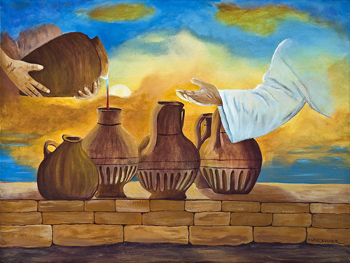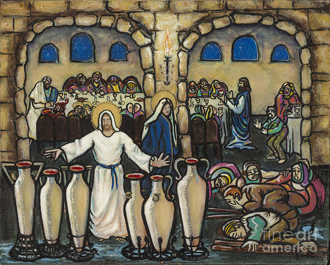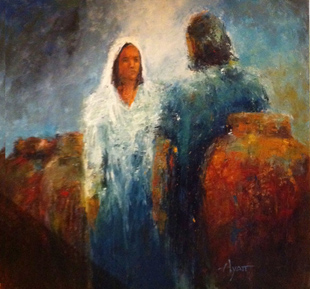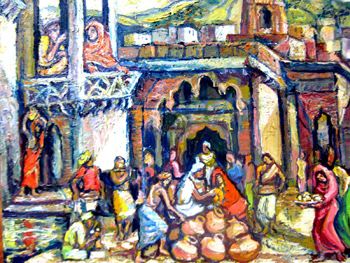For Sunday January 20, 2019
Lectionary Readings (Revised Common Lectionary, Year C)
Isaiah 62:1-5
Psalm 36:5-10
1 Corinthians 12:1-11
John 2:1-11
I doubt it’s the line I’m supposed to fixate on in this week’s Gospel reading, but I can’t help it. I can’t help wondering exactly how Mary says it. Quietly, urgently, after pulling her distracted son away from his friends, away from the music and the dancing, away from the servants working hard to hide their growing panic as countless wedding guests swirl obliviously around them. I imagine Mary takes Jesus into an inner room, fixes his attention with a stern stare, and whispers the shameful news into his ear: “They have no wine.”
The wedding in Cana story is not — finally — a story about scarcity. It’s a story about abundance. Lavish, excessive, extravagant abundance. As an “epiphany” story, Jesus’s transformation of water into wine clearly reveals God’s generous nature. For John, the Gospel writer, the miracle constitutes the first of seven “signs,” or proofs of Jesus’s deity, and signals the onset of the Incarnate Word’s public ministry.
Needless to say, there is so much theological richness to mine in this story. The eschatalogical significance of a wedding as the backdrop for Jesus (our bridegroom’s) first miracle. The importance of joy, celebration, pleasure, and hospitality Jesus affirms in conjuring 150 gallons of first-rate wine, just to keep a party going. God’s endless capacity to transform the ordinary into the sacred, the weaker into the stronger, the incomplete into the whole. The foreshadowing of the Eucharist in the sharing of the wine.
 |
All of this richness strengthens my faith, and all of it is worth exploring. But what strikes me here and now, as I struggle to reconcile a Bible story about abundance with my contemporary reality — both personal and global — of scorching scarcity, is the pivotal role Mary plays in the story. Her line, “They have no wine,” is a line I can get behind. “They have no money.” “She has no cure.” “He has no friends.” “I have no strength.” Mary’s line is a line I repeat daily, in endless iterations, for myself and for others. It’s the line I cling to when I feel helpless, when I have nothing concrete to offer, when Christianity seems futile, when God feels like he’s a million miles away. It’s the line that insists against all odds on the mysterious power of telling God the truth in prayer.
So I’ve been pondering Mary’s role in Jesus’s first miracle. It’s an odd and provocative role, but I’m grateful for it, because it allows me a place in what otherwise feels like an inaccessible narrative. I have no idea how to turn gallons of water into gallons of wine. But I do know how to say what Jesus’s mother says. Sometimes, it’s the only thing I know how to say. "There is need here." "Everything is not okay." "We’re in trouble." "They have no wine."
Here are some aspects of Mary’s role I've been thinking about and finding helpful:
-
Mary notices. In the ancient world, wedding feasts lasted for days, and it was the host’s sacred responsibility to provide abundant food and drink for the duration of the festivities. To run out of wine early was a dishonor and a disgrace — a breach of hospitality that the guests would remember for years. I can easily imagine how the servants of the house must have gone limp with fear; this was the kind of miscalculation that could cost them their jobs — or worse. We have no idea what Mary’s connection is to the bride and groom; all we know is that she is one wedding guest among many. But even in the midst of celebration and distraction, she notices need. She sees what’s amiss. She perceives the high likelihood of scandal and humiliation brewing beneath a seemingly glossy surface. If John’s account is trustworthy, Mary notices and registers concern before Jesus does.
- Mary tells the right person. John’s Gospel doesn’t include any infancy narratives. No angelic annunciations. No babe in the manger. No prophetic words or portentous stars. But the Mary John describes still knows who her son is. She knows what he’s capable of, and she trusts that he alone can meet the need she perceives. I love the assurance with which she brings her distress to Jesus. Given her thirty-year history with him, given the relationship they’ve cultivated together, she is as certain of his ability and his generosity as she is of the need itself.
- Mary persists. This, for me, is the oddest and yet most encouraging part of the story. I don’t know what to make of Jesus’s reluctance to help when Mary first approaches him. “What concern is that to you and me?” he asks her dismissively when he hears about the dwindling wine supply. “My hour has not yet come.” Of course, Jesus is no fool; he knows that his countdown to crucifixion will begin as soon as he makes his true identity known. Maybe he’s reluctant to start that ominous clock ticking. Maybe he thinks wine-making shouldn’t be his first miracle. Maybe he’s having fun with his friends, and doesn’t want to be interrupted. Maybe there’s a mysterious timeline he prefers to follow — a timeline known only to him and to God. Whatever the case, Mary doesn’t cave in the face of his reluctance; she continues to press the urgency of her need into Jesus’s presence. As if to say, “I don’t care about your ‘hour’ — there’s a desperate problem, right here, right now. Change your plans. Hasten the hour. Empathy first. Help!”
-
Mary instills trust, and invites obedience. “Do whatever he tells you,” she advises the household servants. I admire the fact that she doesn’t wait to hear the specifics of Jesus’s plan. She doesn’t pretend to know the details; she doesn’t invent a roadmap. She simply communicates her long-standing trust in Jesus’s loving, generous character, and invites the servants to practice the minute-by-minute obedience that alone makes faith possible. If I’m reading the story correctly, the servants’ task isn’t easy. There’s no running water in the ancient world, and those stone jars are huge. How many trips to the well, how much arm strength, how deep a resolve, the task requires! I imagine it’s Mary’s faith that helps the servants persevere when they feel bewildered and ridiculous. She acts as a catalyst, turning potential into action. She lays the groundwork for Jesus’s instructions: “Fill the jars.” “Draw some out.” Take it to the chief steward.” She fosters a faith-filled atmosphere that becomes contagious. She instills wonder in those around her, and ushers in a miracle.
Maybe I'm so drawn to Mary this week because it's a hard business, holding the promise of God’s abundance up against the agony of scarcity, loss, and need. Don't get me wrong; I love the miracle itself, and all that it signifies. But I'm more acquainted with water than I am with wine. Many of us are, if we're honest. It doesn’t matter what the particulars look like — chronic illness, physical pain, financial trouble, systemic injustice. Regardless of how we rewrite Mary’s line to match our circumstances, it rings true for all of us, in some guise or another. They have no wine.
 |
So what do we do? What can our place be in a miracle of plenty?
Maybe we can be like Mary. Maybe we can notice, name, persist, and trust. No matter how profound the scarcity, no matter how impossible the situation, we can elbow our way in, pull Jesus aside, ask earnestly for help, and ready ourselves for action. We can tell God hard truths, even when we’re supposed to be celebrating. We can keep human need squarely before our eyes, even and especially when denial, apathy, or distraction are easier options. And finally, we can invite others to obey the miraculous wine-maker we have come to know and trust.
"They have no wine." “Do whatever he tells you.” We live in the tension between these two lines. Let's live there well, confident of the one whose help we seek. Because he is good. He is generous. He is Love.





